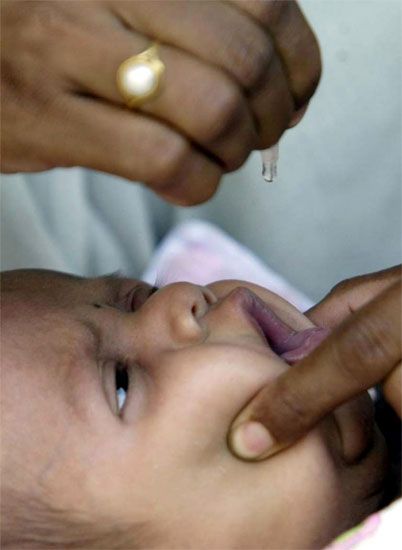 Amidst concerns over resurfacing of polio cases in India, the World Health Organisation on Saturday said there is "no threat" to the polio-free status of all Southeast Asian region countries, including India, and the detection of a rare strain of the crippling disease is "not unusual".
Amidst concerns over resurfacing of polio cases in India, the World Health Organisation on Saturday said there is "no threat" to the polio-free status of all Southeast Asian region countries, including India, and the detection of a rare strain of the crippling disease is "not unusual".
Noting that all the countries including India maintain a "high vigil" for the detection of the disease, the World Health Organisation's Southeast Asia regional office said that no child has been afflicted by wild polio virus since the last case was reported from West Bengal in January, 2011.
"All countries in the Region continue to maintain a very high vigil for polio virus detection. As part of this, environmental surveillance -- collection of samples from sewage -- is being conducted regularly from 30 sites across seven states in India," it said in a statement.
There is "no threat" to the polio-free status of all Southeast Asian region countries, including India, it added.
The statement comes after a 6-year-old child of Padrauna village in Gaisdi in Balrampur district in Uttar Pradesh was admitted to a hospital on suspicion of polio, following which the state health officials have sent a report to the WHO.
Prior to this case, vaccine-derived poliovirus type 2 was detected in a sewage sample collected from a site in Hyderabad.
Following these cases, the Union health minister has initiated a probe and maintained that though it comes across thousands of such cases every year, none of them has been detected of polio.
WHO SEARO said that on very rare occasions, VDPVs are isolated from sewage samples, and prompt and adequate response to VDPVs detected in the samples in the past has prevented any spread of these viruses in the community.
"Such viruses have been detected from environmental samples only -- no children have been affected nor cases of paralysis associated.
"Detection of such rare VDPVs is not unusual or unexpected and robust short- and long-term management strategies are in place to adequately manage the small risks associated with such isolates," it said.
"The Southeast Asia region was certified polio-free on 27 March 2014 and there is no threat to the Region's polio-free status from the VDPV isolates in the sewage samples," the WHO said.
WHO's Southeast Asia region comprises of Bangladesh, Bhutan, Democratic People's Republic of Korea, India, Indonesia, Maldives, Myanmar, Nepal, Sri Lanka, Thailand and Timor-Leste.
To further mitigate the small risk of VDPVs, globally nearly 155 countries have switched from using the trivalent oral polio vaccine to the bivalent oral polio vaccine, it said.
"The switch in April 2016, under the polio end game plan is a critical step to prevent VDPVs and stop all polio, whether due to wild or vaccine-derived viruses, it said.
It added that the Union health ministry which is supported partner of the Global Polio Eradication Initiative, continues to conduct strong surveillance for any poliovirus from any source and also continues to strengthen overall population immunity to ensure children continue to be fully protected from lifelong polio paralysis.










 © 2025
© 2025